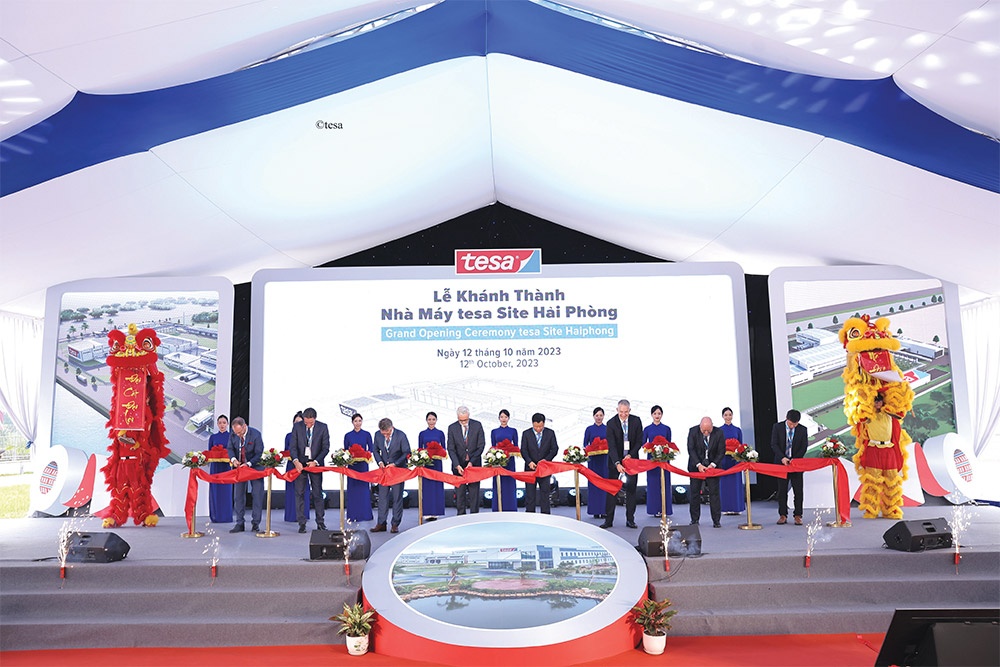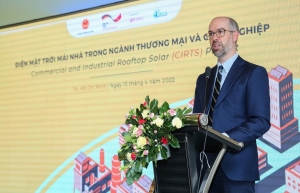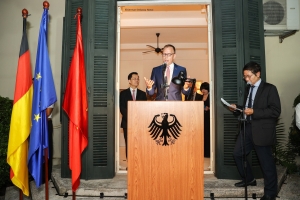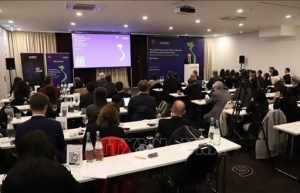Germany-Vietnam ties continue to bloom
 |
| Ambassador of Germany to Vietnam, Dr. Guido Hildner |
The Lunar New Year celebrations are an opportune moment to shed light on the progress and prospects of German-Vietnamese trade and investment cooperation for 2024, the importance of the European Union-Vietnam Free Trade Agreement (EVFTA), and the challenges that both countries need to address to strengthen their ties. As we embark on the Vietnamese New Year, let us embrace the potential of this relationship and work towards a prosperous and greener future.
Over the years, our two nations have successfully worked towards deepening their trade and investment cooperation, with renewable energy emerging as a significant métier. The recent visit of German Federal President, Frank-Walter Steinmeier, to Vietnam has renewed the focus on this important field of cooperation. Members of the high-ranking business delegation that accompanied the president looked for opportunities to enter the Vietnamese market, to strengthen their economic ties with Vietnam or even to consider investment in the country.
At the same time, German companies are actively recruiting Vietnamese talents, in order to meet a significant skilled labour shortage at home. German employers will therefore continue to increase their efforts to attract Vietnamese workers for a career in Germany. This shows the modern side of the Vietnamese-German relationship: We are collaborating in order to improve the economic, social and environmental situation of both countries and peoples.
Trade and investment outlook
Germany and Vietnam have witnessed a steady growth in their trade and investment relations over the years. After the recent pandemic, two-way trade between our nations has developed positively, and direct investments from Germany have flowed into Vietnam at an increased pace. The economic outlook for 2024 is promising, with global headwinds softening and international demand rising again.
Germany, as Europe’s largest economy and a world leader in technology and innovation, offers a wealth of opportunities for Vietnamese businesses. The German market provides access to advanced technology, machinery, and expertise, while also presenting healthy consumer demand for Vietnam’s exports. This already mutually beneficial relationship has laid the foundation for a stronger economic partnership in the coming year.
Vietnam’s ambitious energy transition plans and Germany’s recognised expertise in renewable energy technologies have created a solid foundation for cooperation in this sector. Both countries acknowledge the importance of transitioning to sustainable and clean energy sources to combat climate change and achieve their respective environmental goals. Germany has been a leading player in renewable energy technologies for many years. The country’s renewable energy sector has successfully transitioned its energy mix towards cleaner alternatives, including wind, solar, and hydroelectric power. German companies have accumulated extensive knowledge and experience in these fields. They are prepared to share the best practices with their Vietnamese counterparts.
Vietnam offers significant potential for the expansion of renewable energy, with its abundant solar and wind resources. The government has set commendable targets to increase the share of renewable energy sources in its energy mix, aiming for 31-36 per cent renewable energy in 2030 according the Power Development Plan VIII, or even 47 per cent in the context of the Just Energy Transition Partnership. Collaborating with Germany will allow Vietnam to leverage German technology and expertise to achieve these targets more efficiently.
Germany’s engagement in Vietnam’s renewable energy sector is already evident. German companies have invested in wind and solar energy projects, providing not only financial resources but also technology transfer and knowledge sharing. Furthermore, German banks have been instrumental in providing financial support and expertise for renewable energy projects in Vietnam. A high number of additional German companies stand ready to invest in on- and offshore wind parks as well as in solar farms in the country, just waiting for the legislative framework to ripen.
 |
| Efforts to harmonise standards will contribute to a more efficient and transparent environment for businesses |
Importance of the EVFTA
The EU-Vietnam Free Trade Agreement (EVFTA), which came into force in 2020, has been instrumental in strengthening the economic ties between Germany and Vietnam. This comprehensive trade agreement has facilitated increased market access for goods and services, reduced trade barriers, and provided a framework for enhanced cooperation in various sectors, including renewable energy. Under the EVFTA, both countries have committed to promoting sustainable development and climate change mitigation. This aligns perfectly with the renewable energy objectives of Vietnam and Germany, creating new avenues for bilateral cooperation in this sector.
The agreement eliminates tariffs and reduces non-tariff barriers, ensuring a level playing field for businesses from both countries. Vietnamese exports, especially agricultural products, textiles, and seafood, benefit significantly from improved market access to Germany. The removal of barriers to trade and investment has encouraged German companies to explore opportunities in Vietnam, leading to increased foreign direct investment and technology transfer in sectors such as manufacturing and renewable energy.
Moreover, the EVFTA emphasises the importance of environmental protection and sustainable development, with specific provisions on labour and environmental standards. This ensures that economic cooperation between Germany and Vietnam goes hand in hand with environmental responsibility and social welfare. The German Supply Chain Due Diligence Act and the upcoming EU legislation on this matter supplement these endeavours and guarantee for a cooperation that is in line with the highest labour and environmental standards. German companies are delighted to see that their Vietnamese counterparts fully embrace these regulations and consider them an economic opportunity.
The path forward
While Germany-Vietnam economic relations are thriving, several challenges should still be addressed to further solidify and expand the trade and investment ties.
Firstly, to maximise the benefits of the EVFTA, Vietnam needs to align the regulatory framework to enhance business environments and ensure the smooth flow of goods, services and investments. Continuous efforts to harmonise regulations and standards as well as to accelerate decision-making procedures will contribute to a more efficient and transparent business environment. Investors from Germany are particularly interested in reliable and transparent legal conditions.
Secondly, Vietnam needs to continue investing in infrastructure development to create an enabling environment for trade and investments. This includes improving transportation networks, logistics systems, and energy infrastructure to support the renewable energy sector’s growth. Germany, and especially German companies, stand ready to assist with their knowledge and expertise.
Finally, Vietnam should continue to invest in developing a highly skilled workforce capable of driving the growth of the entire economy and especially of the renewable energy sector. Providing vocational training programmes and scholarships, as well as sharing best practices, will help build a sustainable talent pool to support the industry’s needs.
 | Vietnam and Germany promote rooftop solar in commercial and industrial sectors The rooftop solar project, implemented by GIZ in tandem with the Ministry of Industry and Trade, focuses on the adaptation of relevant technical regulations, key stakeholder capacities, and technology cooperation, with an aim to ensure the sustainable development of the Vietnamese market. |
 | Germany to support Vietnam in fostering socioeconomic growth Germany is willing to make significant efforts to support Vietnam in achieving its socioeconomic growth goals in collaboration with the target of carbon neutrality by 2050 and the phase-out of coal-fired energy by the 2040s. |
 | Germany ready to assist Vietnam in energy transition: official A German official has voiced the country’s readiness to become a trustworthy and capable partner helping with energy transition in Vietnam. |
What the stars mean:
★ Poor ★ ★ Promising ★★★ Good ★★★★ Very good ★★★★★ Exceptional
Related Contents
Latest News
More News
- Kurz Vietnam expands Gia Lai factory (February 27, 2026 | 16:37)
- SK Innovation-led consortium wins $2.3 billion LNG project in Nghe An (February 25, 2026 | 07:56)
- THACO opens $70 million manufacturing complex in Danang (February 25, 2026 | 07:54)
- Phu Quoc International Airport expansion approved to meet rising demand (February 24, 2026 | 10:00)
- Bac Giang International Logistics Centre faces land clearance barrier (February 24, 2026 | 08:00)
- Bright prospects abound in European investment (February 19, 2026 | 20:27)
- Internal strengths attest to commitment to progress (February 19, 2026 | 20:13)
- Vietnam, New Zealand seek level-up in ties (February 19, 2026 | 18:06)
- Untapped potential in relations with Indonesia (February 19, 2026 | 17:56)
- German strengths match Vietnamese aspirations (February 19, 2026 | 17:40)

 Tag:
Tag:




















 Mobile Version
Mobile Version